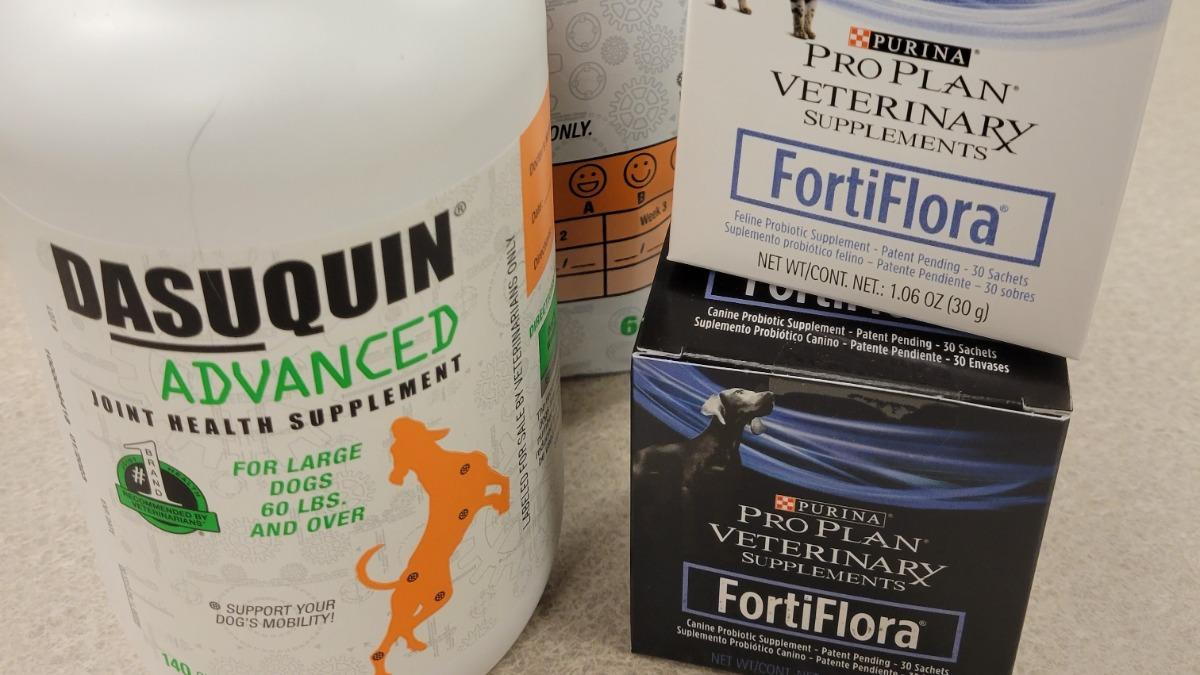What Natural Products are Safe for Pets?

- posted: Aug. 30, 2021
What Natural Products are Safe for Pets?
There seems to be a trend in trying natural supplements for treating illnesses in ourselves as well as in our pets. But are there safe and effective natural products for dogs and cats? These 5 supplements are generally safe and may help treat a number of health issues in our pets.
- Omega-3/Omega-6 fatty acids (fish oil)—omega fatty acids such as DHA and EPA are found in fatty fish such as salmon, tuna and sardines and in some plants like flaxseed and walnuts. These omega compounds are thought to reduce inflammation in joints and promote healthy skin and coat. Omega supplements may also improve heart and brain health and are often suggested for pets with heart disease and cognitive dysfunction. While generally safe, too much fish oil can affect platelet clotting and pets could experience stomach upset like vomiting or diarrhea. Use with caution in pets who may be on blood thinners or have clotting problems. Make sure to purchase a reputable brand of fish oil for pets—ask our vets for recommendations.
- Glucosamine/chondroitin sulfate—glucosamine/chondroitin supplements protect the cartilage in joints from further damage and provides building blocks for cartilage components. It does not necessarily reduce pain, but it can delay serious joint changes due to arthritis or injury and may reduce the need for high doses of pain medications. Side effects are rare—stomach upset is the most common. It’s pretty hard to overdose on glucosamine, but more glucosamine is not necessarily more effective so stick to the dosing per weight on the package. Again, purchase reputable brands such as Cosequin or Dasuquin or ask our vets for recommendations on effective products.
- Probiotics and pre-biotics—Probiotics are beneficial bacteria that can often reduce gastrointestinal upset, resolve or prevent diarrhea by replacing good gut bacteria and some forms of probiotics may even help to reduce anxiety. Pre-biotics are sometimes included as the “food” for the beneficial bacteria which may make products more effective. Again, side effects are extremely rare, but in rare cases a pet may experience GI upset from probiotics. Probiotics are available as powders, capsules and chews and are sometimes included in dog and cat foods. Make sure to use products specific to dogs and/or cats. Common human gut bacteria differ from those found in pets and may not be as effective.
- Ginger—Just as in humans, ginger may be used to try to calm an upset stomach in dogs and cats. There are limited studies in pets as to efficacy of ginger, but it is relatively safe to try for problems such as motion sickness or nausea associated with conditions like kidney disease. Ginger is given by mouth as powder, capsules, tablets or fresh ginger root though fresh ginger may be a bit spicy for pets. Side effects are rare but can include allergic reaction such as redness and itching if contact with skin occurs and GI upset/diarrhea. Use with caution in pets who are taking NSAIDs (non-steroidal anti-inflammatory drugs like carprofen, meloxicam) or blood thinners.
- Turmeric—turmeric is a spice thought to reduce joint inflammation and may act as an immune booster. Studies are limited, but turmeric supplements appear to be safe for pets. There are commercially available chews and pastes available as well as the powdered spice. Side effects are uncommon but turmeric could cause stomach upset.
In addition, alternative therapies such as laser therapy and acupuncture can also be effective at reducing pain and inflammation as a complement to or instead of traditional drugs and medical therapies. As always, inform your vet of any supplements your pet may be taking and check with your vet for proper dosing. Even though these are natural products, too much of a good thing may cause problems for your pet. It’s also best to use brands specific for pets rather than human generics (with the exception of ginger/turmeric) to ensure quality control and proper absorption and effectiveness.
This blog brought to you by the Patton Veterinary Hospital serving Red Lion, York and the surrounding communities.
Location
Patton Veterinary Hospital
425 E Broadway
Red Lion, PA 17356
